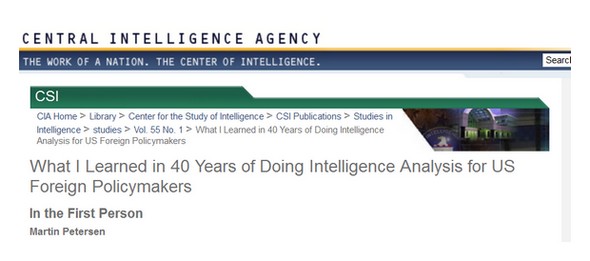Ein paar Punkte, die das Versagen der Geheimdienste in Deutschland bei der Verhinderung und der Aufklärung der NSU-Morde erklären können, habe ich ja schon angeführt:
- Es fehlen Standards in der Ausbildung.
- Eine intelligence community im eigentlichen Wortsinn existiert praktisch nicht, in der ein personeller und ideeller Austausch zwischen den Sphären stattfinden könnte, und
- die Bunkermentalität einer auf konspirative Methoden fixierten Bürokratie verhindert eine zusammenführende Analyse und damit die Produktion von actionable intelligence.
Als wenn das nicht schon schlimm genug wäre, kommt auch noch ein generelles Unverständnis der Öffentlichkeit über nachrichtendienstliche Arbeitsweisen und Methoden hinzu – der Grad der Empörung verhält sich meist umgekehrt proportional zur Expertise der Kritiker. Was völlig fehlt, ist eine Innensicht, die sich kritisch, aber gleichzeitig konstruktiv mit den Bedingungen dieser Arbeit auseinandersetzt.
Daher verweise ich gerne auf einen Besinnungsaufsatz des ehemaligen Deputy Executive Directors der CIA Martin Petersen mit dem wunderbaren Titel „What I Learned in 40 Years of Doing Intelligence Analysis for US Foreign Policymakers“. Es lohnt sich, das ganze Stück zu lesen – hier nur ein paar Punkte aus dem Inhalt.
- Zur öffentlichen Wahrnehmung: „Truth number three: the public does not segregate success and failure… in the intelligence business success is transitory, and failure is permanent.“
- Zur Bedeutung einer klaren Aufgabendefinition: „Forty years of experience have taught me that failing to identify a specific audience and an intelligence question up front is often at the root of the weakest analytic efforts.“
- Zu Fehlern, die regelmäßig dazu führen, dass Berichte keinen effektiven Nutzen für die handelnden Politiker haben – wenn nämlich Entscheidungsgrundlagen nicht ausgeführt werden oder Begriffe verwendet werden, die nicht klar definiert sind.
Die sechs Lernerfahrungen in ausgewählten O-Tönen:
- First, how one thinks about the mission affects deeply how one does the mission. I think the intelligence analyst’s mission is less about “connecting the dots” (although sometimes it is) or predicting the future (although sometimes it is) or speaking truth to power (although we often do) than it is about understanding the world… It is the difference between strategic understanding and tactical command of an issue.
- Second, intelligence failures come from failing to step back to think about underlying trends, forces, and assumptions —not from failing to connect dots or to predict the future.
- Third, good analysis makes the complex comprehensible, which is not the same as simple. The key to making the complex comprehensible is having in mind a specific audience and a very precise intelligence question for the analysis to tackle. Data dumps and murky analysis almost always are rooted in trying to write about a development without first asking, “Who is my audience and what specific question does it need answered?” It is that difference between “we need a piece on the rioting in Athens” and “we need a piece on the government’s options for addressing the underlying cause of the rioting.” …We do very well as a rule in responding to questions from policymakers. We come up short when we have to supply the audience and the question ourselves and we start to write before we have done all the thinking.
- Fourth, there is no substitute for knowing what one is talking about, which is not the same as knowing the facts. Former CIA Director Michael Hayden once famously said, “If it is a fact, it ain’t intelligence.” The business of intelligence analysts is more about putting facts in perspective than it is having command of the facts. We are paid not for what we know, but for our ability to think about what we know—or think we know. It is about knowing what is important. It gets back to those assumptions, drivers and variables I dwell on… Sources—clandestine, open source, technical, diplomatic, etc.—are not the same as knowledge.
- Fifth, intelligence analysis starts when we stop reporting on events and start explaining them.
- Sixth, managers of intelligence analysts get the behavior they reward, so they had better know what they are rewarding. This is a message for all managers and all who aspire to management. It is my experience that if you have clear standards and are seen as consistent and fair in applying them, your unit will live up to the standard. And, you must also hold yourself to the same standards. If you value analytic tradecraft, talk about it and practice it. If you want open communication where different interpretations are considered, invite it. If you want honesty, be honest. And reward the behavior you profess to value.

